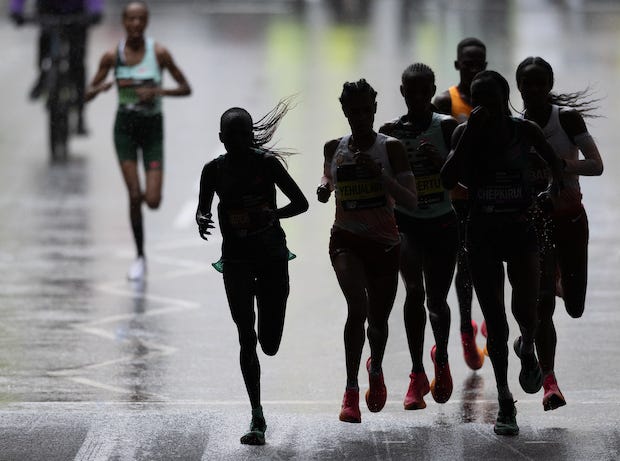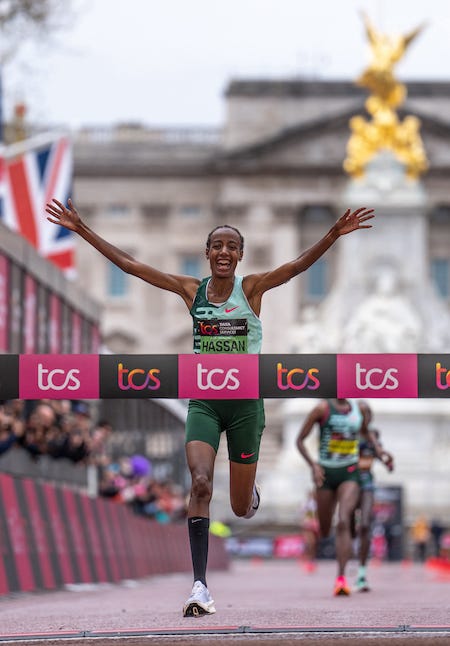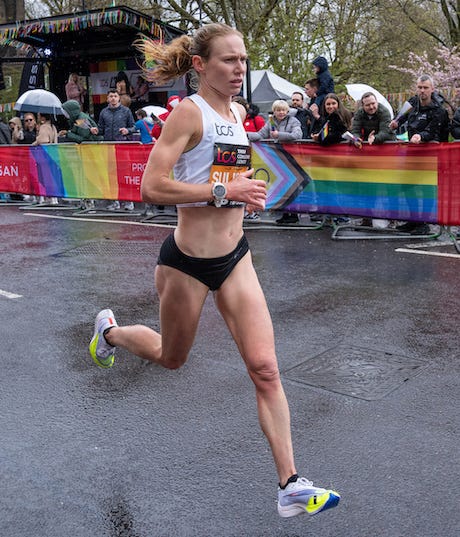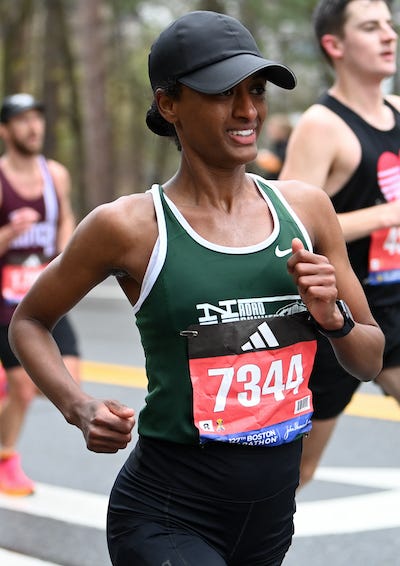Fast Women: Sifan Hassan’s surprising marathon debut
Susanna Sullivan leads the Americans, Jenny Hitchings sets a world record
Issue 234, Sponsored by OOFOS
After stopping, Sifan Hassan fights back to London Marathon win
Sifan Hassan stole the show at the London Marathon’s pre-race press conference, with lines like, “Sometimes I wake up and think: ‘Why the hell am I running a marathon?’” Hassan, the reigning Olympic champion in the 5,000m and 10,000m, was making her marathon debut in London, and she was understandably nervous.
Her training was particularly challenging because she was observing Ramadan in the month leading up to the race, fasting from dawn to sunset. Hassan, who represents the Netherlands, was uneasy about what fueling during the race would do to her stomach, after a month of being unable to take fuel during training.
The morning of the race, Hassan was even more on edge. “I never cry. I was crying this morning,” she said after the race. “Why did I say I’m going to run a marathon? What is wrong with me?” But Hassan approached the race from a place of curiosity about how long she could stay with the lead pack, and the outcome was beyond her wildest dreams.
The first casualty of the race was world record holder Brigid Kosgei of Kenya, who limped about 1K before stepping off the course. She had said during the pre-race press conference that she was dealing with a hamstring injury. She later posted a statement saying she felt pretty good during the warmup and apologizing to the race organizers and fans.
Through 15K, there was a pack of nine runners together, with Hassan hanging out at the back. But Hassan stopped to stretch twice during the 12th mile, and by 20K, she was 11 seconds behind the lead pack of eight. By 25K, the gap had grown, with Hassan 28 seconds behind Kenya’s Peres Jepchirchir, who led the race.
But when the pacesetters dropped out, the lead pack slowed, which created an opportunity for Hassan. From 25K to 30K, she made up 25 seconds on the lead pack, cutting the gap to three seconds. Then she fell back again and was 14 seconds behind the leaders at 35K (about 4.5 miles to go). And in the 23rd mile, Hassan caught the leaders for good.
The pack was down to Ethiopia’s Yalemzerf Yehualaw and Alemu Megertu, Jepchirchir, and Hassan, with a small gap back to Kenya’s Sheila Chepkirui. (Chepkirui was supposed to run Boston, but she ran into visa trouble.) As they approached the 40K fluid station, Jepchirchir gradually cut over to the other side of the road to get her bottle, while Yehualaw and Megertu opted to skip theirs. It looked like Hassan would too, until she abruptly cut across the street to get hers, almost getting taken out by one of the lead motorcycles in the process. When Hassan caught back up, she didn’t seem too stressed, and she offered her bottle to Yehualaw, who has the same manager.
With less than three minutes remaining in the race, Yehualaw fell off the back of the pack, but Jepchirchir, Hassan, and Megertu stayed together until the finish line was in sight. Hassan didn’t take the lead until about 100m to go, but when she went, she really went. Hassan broke the tape in a Dutch record of 2:18:33, with Megertu second (2:18:37) and Jepchirchir third (2:18:38). Chepkirui moved up to fourth (2:18:51), and Yehualaw took fifth (2:18:53).
After crossing the finish line, Hassan expressed her disbelief about everything that had just transpired. “I can’t believe I’ve finished, let alone won,” she said. Hassan thought about stopping many times along the way, but she said that she felt better the last 2K.
“I learned to be patient, and to run your own race,” she said. “Just keep going as much as possible and perhaps you will surprise yourself.”
In their post-race comments, both Megertu and Jepchirchir mentioned struggling with the rain, and looking at the splits, I wonder if that was why the second half of the race wasn’t faster. Everyone in the elite women’s race slowed down, even Hassan, who ran 1:08:40/1:09:53 half splits.
Hassan’s London Marathon story is an excellent one. I can’t remember the last time someone came back from a deficit like this, and to do so in her debut, when she was uncertain about her preparation, is fantastic.
Does it make me uneasy that Alberto Salazar was Hassan’s coach when he was banned for doping violations? Absolutely. Salazar was banned by the U.S. Anti-Doping Agency for four years—that ban expires at the end of September, BTW—but none of his athletes were banned. But it’s not up to me to decide who is or isn’t doping. There are agencies that do that, and the only way I can really be a fan of the sport is to trust that they’re doing a good job. (Results | Full race replay | Hassan’s post-race interview | A good Guardian article about Hassan’s race)
Susanna Sullivan leads the Americans, Jenny Hitchings sets a world record
Susanna Sullivan finished 10th in the London Marathon pro field, running a 47-second personal best of 2:24:27. She was representing Team TCS Teachers, which is made up of teachers who run marathons. (TCS did a nice, short video on her in advance of the race.) Sullivan’s time makes her the fifth U.S. woman, along with Aliphine Tuliamuk, Emma Bates, Betsy Saina, and Lindsay Flanagan, to earn the 2024 Olympic standard. Being on the list doesn’t mean anyone’s on the team, it just means they’re eligible to be selected.
Jenny Hitchings, 59, of the U.S. won the 55–59 age group in 2:45:27, a world age-group record. She was the second-fastest American woman to finish the race, regardless of age.
The wheelchair race was fantastic, and it came down to a four-way sprint finish with Madison de Rozario edging out four-time champion Manuela Schär, 1:38:51 to 1:38:52. Catherine Debrunner took third (1:38:54), and Susannah Scaroni finished fourth in 1:38:57, six days after she won the Boston Marathon.
Thanks to OOFOS for sponsoring Fast Women this month!
We are still coming down from the excitement of the Boston Marathon and are in recovery mode with OOFOS!
OOFOS is the global leader in Active Recovery footwear. Designed with proprietary OOfoam™ technology, OOFOS absorb impact so your body doesn’t have to. Combined with a patented footbed design, OOFOS cradle the heel and arches for the optimal combination of soft and stable support. It’s not just soft, it’s science. OOfoam™ technology is proven to absorb 37% more impact than traditional foam materials, decrease load rates up to 88% and reduce energy exertion on the ankles by as much as 47%—all of this reducing load and stress, so you can recover faster and get back to doing what you love!*
OOFOS continues to pioneer advancements in the Active Recovery category with its latest introduction, the OOmg Sport. An athlete-inspired, closed-toe shoe built for post-run recovery but equally ideal for casual wearers, the OOmg Sport is constructed on the same proven foundation of OOfoam™ and the brand’s patented footbed geometry found in other OOFOS models—from the OOriginal Slide to the OOcoozie slipper, but the OOmg Sport design stands apart from other models with the addition of a tapered sidewall that provides both athletic styling and functional benefit. Paired with the brand’s unique 4-way stretch FibreFlex upper material, the OOmg Sport offers a sock-like fit that provides 360-degree distribution of pressure and maximum foot mobility for optimal recovery.
*Based on a 2018 University of Virginia School of Medicine Speed Clinic
Eilish McColgan’s sponsor conflict
On Friday, London Marathon organizers announced that Eilish McColgan had withdrawn from the race due to injury. Then McColgan posted on Instagram saying yes, she was injured, but added that she had been told “I wouldn't be allowed to race, due to a sponsor clash” between one of her sponsors and the race’s sponsors. A bit later, she confirmed that the conflict was between Science in Sport (SIS) and race sponsor Lucozade, both hydration companies.
Race director Hugh Brasher declined to comment directly on the situation on Friday, saying “We believe that face to face conversations are always the best way to understanding and we’ll be talking to Eilish later this weekend.”
On Saturday, McColgan tweeted, “Changes were made in our sport to allow athletes to have an extra personal sponsor on their vest. But that personal sponsor cannot be deemed a ‘clash’ with the sponsor of the race—limiting what personal sponsor you can have and which faces you can do.” If/when Brasher is willing to comment, I’ll be curious what he has to say. I was pleased to see Annie Frisbie racing with two sponsors (plus her team) on her uniform in Boston.
The latest on the mile 21 incident at the Boston Marathon
When I last wrote about the heavy police response at mile 21 of the Boston Marathon, where BIPOC run crews were cheering, the first stories were just starting to come out. Here are some updates:
The Newton police department said that they responded in the way they did, sending a line of officers to block the course with bikes, because they were “notified by the B.A.A. three times about spectators traversing the rope barrier and impeding runners.”
Lawyers for Civil Rights filed a public records request for all police incidents, reports, and surveillance activity along the marathon route.
TrailblazHers Run Co and the Pioneers Run Crew demanded an official statement and apology from the B.A.A., the mayors of Newton and Boston, and a statement and apology from the police.
In an email to the community, Newton’s mayor, Ruthanne Fuller, said she and the police chief want to meet with members of TrailblazHers and Pioneers.
On Thursday, B.A.A. president and CEO Jack Fleming put out a statement. I thought it started off okay, with lines like, “We did not deliver on our promise to make it a great day for everyone.” And “We need to do better to create an environment that is welcoming and supportive of the BIPOC communities at the marathon.” But in the final paragraph of what was supposed to be an apology to spectators who were upset about being overpoliced during the race, Fleming then expressed his gratitude to law enforcement agencies.
Physician Open Wing Runners (POWR), a group of nearly 1500 physicians who run, put out a strongly worded statement, criticizing what Fleming had to say. It ended with the line, “If you don’t name the problem, you can’t fix it.” Fleming’s statement didn’t mention what happened, which led to a lot of comments on social media asking what the statement was in response to. It also did not include any concrete steps that the B.A.A. will take. Boston.com asked for clarification on possible steps, but they were told the B.A.A. wouldn’t be saying anything more at this time.
Des Linden weighed in on Instagram: “@pioneersrc @trailblazhersrunco are changing the game, on the course and off of it. Nobody said it would be easy, but I see you and I’m here for the long game. Keep showing up.”
I also appreciated what Erika Kemp, who used to run and work for the B.A.A., had to say on the Run Eat Sleep Show: “You’re literally sucking the joy out of such a magical experience for so many people and for what? Because you thought they were cheering excessively when it’s like all I want, in that moment, is excessive cheering?”
I understand that the B.A.A. is in a tough position, because the Boston Marathon, the event that keeps their organization afloat, won’t happen without cooperation from the police and all of the towns along the route. I’d like to see the B.A.A. address the Newton police’s statement that they showed up because they were summoned by the B.A.A.
I’m glad this has picked up steam in the mainstream media. I hope it will lead to more answers and a better event. This is a pivotal moment for the B.A.A., and so far I’ve been disappointed by their response. (More details: Articles from GBH News and Runner’s World)
Other News and Links
It seems that I need to correct what I said in Tuesday’s newsletter. It looks like the Boston Marathon did produce one new Olympic Trials qualifier on the women’s side. Kidan Kidane finished 35th in 2:36:22. She started pretty far back, so her gun time was 2:38:41. I missed her, as did others, because World Athletics has her listed as an Ethiopian citizen, but one of her teammates tells me she’s a U.S. citizen, and her team says it’s a qualifier. They also said it was a PR by more than 20 minutes, which sounds like quite the story.
Germany’s Konstanze Klosterhalfen has signed with Puma, and she has joined the North Carolina based Puma Elite team.
Her former Union Athletics Club teammate Jessica Hull announced that she has left the UAC as well. After more than seven years in the U.S., Hull is moving home to Australia. She didn’t mention specific reasons for the move, she just said the timing feels right. Hull got married late last year and I could imagine wanting to live on the same continent as one’s spouse.
This is a good article on NC State star Katelyn Tuohy. “You have to fail at times in this sport. You have to make adjustments. I think what she has is the ability to learn from things that have happened,” says her coach, Laurie Henes.
Outside looked at the shoes the top 25 women and men at the Boston Marathon wore. It’s interesting to read while keeping in mind that the athletes themselves make the biggest difference. Also, the companies weren’t equally represented on the starting line. I’m always curious which shoes the pros would wear if they weren’t obligated to stick to one brand.
Olympian Rachel (Schneider) Smith’s baby, Nova, arrived last Wednesday.
You can probably guess who the most tracked runner was at this year’s Boston Marathon (Boston Globe link). His last name rhymes with hoagie. Only three women made the top 10: Des Linden (11,459), Emma Bates (10,853), and Sara Hall (6,216). Hellen Obiri ranked 13th, with 4,732 people tracking her. To be fair, these numbers don’t necessarily indicate interest level. I didn’t track anyone in the pro field because with their separate start, I figured they’d all be easy to spot.
Jeannie Rice, the 75-year-old who ran a 3:33 at the Boston Marathon, told Sarah Lorge Butler that one of the secrets to her success was slowing down on the early downhills. (Runner’s World)
Mary Ngugi talked to Michelle Katami about the financial ramifications of her competitors’ doping.
I appreciated this TV segment on Debbie Clark, 70, who won the 70–74 age group at the Boston Marathon in 3:38:26. She didn’t run her first marathon until after she turned 50, and there’s definitely something to be said for training and racing on fresher legs.
Registration for Bakline’s McKirdy Micro Marathon, a race set up to help runners achieve the 2024 U.S. Olympic Marathon Trials qualifying time (and some faster standards) is now open.
UTMB announced a new pregnancy policy last week. You can read the full policy here.

Additional Results
Konstanze Klosterhalfen and Angel Piccirillo outkicked NC State’s Katelyn Tuohy on the last lap of the 1500m at Friday night’s Wake Forest Invitational. Klosterhalfen won the race in 4:06.39, and Piccirillo finished second in a three-second PR of 4:07.40. Tuohy, who opened up a small gap early after following the rabbit out, finished third in 4:08.29. Klosterhalfen ran the 800m (third, 2:05.98) earlier in the meet, and Tuohy finished fourth in the 5,000m (15:50.90) later in the meet. Puma Elite’s Fiona O’Keeffe won the 5,000m in 15:25.52, and NC State transfer Amaris Tyynismaa was the top collegian in 15:30.37. Notre Dame’s Katie Thronson won the steeplechase in a 15-second PR of 9:48.54. (Results)
Joselyn Brea won the Payton Jordan Invitational 5,000m in a South American and Venezuelan record of 15:05.56. Madie Boreman (fifth, 15:24.89) was the top U.S. runner, and Utah’s Emily Venters was the top collegian (sixth, 15:26.30). Kassie Parker of Loras College finished seventh and shaved 0.48 seconds off of Missy Buttry’s Division III record, running 15:37.00. Payton Jordan used to be one of the few places to go to run a fast 10,000m in the U.S., but times have clearly changed. This year’s women’s 10,000m had only one finisher, Iona’s Sophie Murphy, who ran 34:28.06, a 53-second PR. But the MVP of the race was Stanford’s Lucy Jenks, who rabbited the race and stayed in for 22 of the 25 laps, keeping Murphy company.
On day two at Stanford’s Payton Jordan Invitational, Skylyn Webb won a good race with Brea in the 1500m. Webb’s winning time, 4:06.73, was a personal best by more than four seconds. She was rabbited by her teammate, Kaela Edwards, through 1200m. Brea challenged Webb on the homestretch, impressive considering it was less than 24 hours after her 5,000m win, and Brea finished second in 4:07.27, another Venezuelan record. (All results)
Jenn Randall won the pro women’s mile at the Oregon Relays, running 4:33.84.
The University of Virginia’s Margot Appleton won the 5,000m at the Virginia Challenge in 15:36.28.
The Hamburg Marathon had a dramatic finish, with Ethiopia’s Tiruye Mesfin falling near the finish and Kenya’s Dorcas Tuitoek passing her for the win, 2:20:09 to 2:20:18. Katja Goldring of the U.S. finished 13th (2:30:31), and Molly Grabill finished 16th (2:32:18). (Results)
Running her first race since the New York City Marathon, Keira D’Amato won the Ukrop’s Monument Avenue 10K, held in her hometown of Richmond, Virginia, in 32:47.
Lindsey Bradley won the inaugural Jersey City Marathon, held in steady rain, in 2:32:51, which qualified her for the U.S. Olympic Marathon Trials. Sarah Sibert finished second in 2:43:09. Roberta Groner used the half marathon as a marathon pace workout, and she won in 1:14:28. (Results)
Rachel Hannah won the Glass City Marathon in 2:40:14, and Ashton Swinford took second in 2:44:59. (Results)
Sarah Higgens, a former Azusa Pacific runner, won the St. Jude Rock ‘n’ Roll Marathon in Nashville, running 2:43:54.

Podcast Highlights
Emily Abbate’s conversation with Viola Cheptoo on the Hurdle podcast covered some heavy topics, including domestic violence and bullying. I thought it was an excellent conversation, and I really appreciated how open Cheptoo was.
Emma Bates talked more about her strong Boston Marathon performance on the Ali on the Run Show.
I briefly mentioned this one above, but Erika Kemp was great on the Run Eat Sleep Show. She said she was ready to try for a faster time in Boston, but a week out from the race, she had really bad food poisoning, so she was happy with what she accomplished.
I really enjoyed Kara Goucher and Chris McClung’s Boston Marathon recap on the Running Rogue podcast.
You can listen to Ali Feller’s marathons and motherhood live show from the Boston Marathon expo with Aliphine Tuliamuk, Sara Hall, and Sara Vaughn here.
Additional Episodes: Kara Goucher on The Drop | Nell Rojas, pre-Boston Marathon, on C Tolle Run | Camille Herron on The Shakeout Podcast | Jamaican middle-distance runner Adelle Tracey on I’ll Have Another | Parley Hannan on D3 Glory Days (I appreciate the honesty in this one, but only listen if discussion of compulsive overexercising and undereating will not be triggering to you.)
Thanks, again, to OOFOS for supporting Fast Women this month! I also appreciate everyone who keeps Fast Women going via your support on Patreon and Venmo. I hope you all have a great week!
Alison







